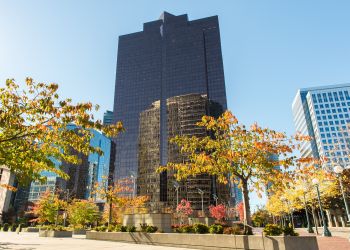
Building Managers: If you received notice to submit a biennial TMP Implementation Report for your building, download a report form here. Reports cover the period Oct. 1, 2023 – Sept. 30, 2025 and are due on Oct 30, 2025.
Bellevue's transportation development code requires developers of large real estate projects to establish and maintain transportation management programs. These programs focus on tenant employees and are intended to reduce traffic impacts from commute trips to a building.
Requirements are established at the time of initial building development and apply for the life of the building. In some cases, there are performance requirements, such as setting a target for the maximum proportion of drive-alone commute trips.
Relevant city code requirements were revised in 2017 (BCC 14.60.070; see also BCC 20.25J.050B for requirements in the Medical Institution District). Under the revised code, performance requirements apply to new office buildings citywide (previously the requirement applied only in downtown). Building managers are provided with a set of options to encourage employees to use commute modes other than driving alone.
Implementation activities at buildings with Transportation Management Program (TMP) requirements may include:
- Posting and distributing transit and ride-sharing information;
- Designating a transportation coordinator;
- Designating preferential parking for carpools and vanpools;
- Providing financial incentives for commuters using carpools/vanpools or transit;
- Providing showers for bicycle commuters.
TMP Implementation Guidelines detail options for implementing requirements at buildings and describe monitoring and reporting processes. The city collects information on TMP implementation activities in the fall of every odd-numbered year from affected buildings. And the city sponsors a commute mode survey in the fall of every even-numbered year for buildings where data is needed to track progress in meeting performance targets.
Transportation Management Program (TMP) activities can help reduce demand on the transportation network, increase the accessibility of a building to employees, balance parking demand with available supply and support LEED (Leadership in Energy and Environmental Design) building certification. The city has similar “Commute Trip Reduction” requirements for large employer worksites.
